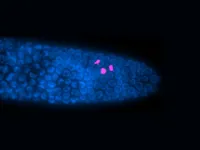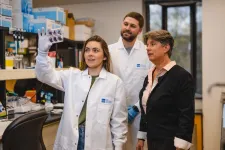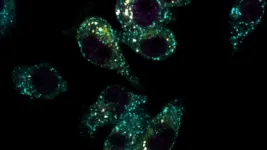(Press-News.org) Obesity is a known risk factor for colorectal cancer. Scientists at the German Cancer Research Center (DKFZ) have now shown that this association has probably been significantly underestimated so far. The reason: many people unintentionally lose weight in the years before a colorectal cancer diagnosis. If studies only consider body weight at the time of diagnosis, this obscures the actual relationship between obesity and colorectal cancer risk. In addition, the current study shows that unintentional weight loss may be an early indicator of colorectal cancer.
Obesity is a risk factor for a whole range of cancers. This association is particularly clear, for example, in the case of endometrial cancer, kidney cancer and also colorectal cancer. According to previous estimates, obese people have a risk of developing colorectal cancer that is about one-third higher than that of normal weight individuals.
"However, these studies have so far not taken into account that many affected people lose weight in the years before their colorectal cancer diagnosis," says Hermann Brenner, epidemiologist and prevention expert at the German Cancer Research Center. "This has led to the risk contribution of obesity being significantly underestimated in many trials."
To assess the magnitude of this bias, Brenner's researchers evaluated data from the DACHS study*. The nearly 12,000 study participants included in the current evaluation had provided information on their body weight at the time of diagnosis and had also reported their weight in the years preceding diagnosis (measured at 10-year intervals).
On the basis of body weight at the time of diagnosis, no indication of a relationship between body weight and colorectal cancer risk could be established. The picture was quite different, however, when the researchers looked at the participants' earlier body weight: Here, a strong correlation between overweight and the probability of developing colorectal cancer was found, which was most pronounced 8 to 10 years before diagnosis. Study participants who were highly overweight - referred to as obese** - during this period were twice as likely as those of normal weight to develop colorectal cancer. "If we had only looked at weight at baseline, as has been done in many previous studies, we would have completely missed the link between obesity and increased risk of colorectal cancer," said Marko Mandic, the study's first author.
In their analyses, Brenner's team was able to identify another trend: A striking number of the study participants affected by colorectal cancer had unintentionally lost weight before diagnosis. An unintentional weight loss of two kilos or more within two years prior to diagnosis (or study entry) occurred 7.5 times more frequently in cancer-affected individuals than in those in the control group. "During this period, the cancer is already there, but not yet noticeable by symptoms. Doctors should therefore regularly ask their patients about unintentional weight loss," Brenner appeals, adding, "Unintentional weight loss could also be an early indication of other cancers or other diseases and should be carefully clarified."
Marko Mandic; Fatemeh Safizadeh; Tobias Niedermaier; Michael Hoffmeister, Hermann Brenner: Association of Overweight, Obesity, and Recent Weight Loss With Colorectal Cancer Risk.
JAMA Network Open. 2023, doi:10.1001/jamanetworkopen.2023.9556
* DACHS stands for: "Colorectal Cancer: Opportunities for Prevention through Screening" and is one of the world's largest case-control studies of colorectal cancer, which it has conducted at the German Cancer Research Center since 2003. Between 2003 and 2020, a total of 6,602 colorectal cancer sufferers and 7,950 people without colorectal cancer participated.
** Overweight above a body mass index of ≥30 kg/m2 is considered obesity.
The German Cancer Research Center (Deutsches Krebsforschungszentrum, DKFZ) with its more than 3,000 employees is the largest biomedical research institution in Germany. More than 1,300 scientists at the DKFZ investigate how cancer develops, identify cancer risk factors and search for new strategies to prevent people from developing cancer. They are developing new methods to diagnose tumors more precisely and treat cancer patients more successfully. The DKFZ's Cancer Information Service (KID) provides patients, interested citizens and experts with individual answers to all questions on cancer.
Jointly with partners from the university hospitals, the DKFZ operates the National Center for Tumor Diseases (NCT) in Heidelberg and Dresden, and the Hopp Children's Cancer Center KiTZ in Heidelberg. In the German Consortium for Translational Cancer Research (DKTK), one of the six German Centers for Health Research, the DKFZ maintains translational centers at seven university partner locations. NCT and DKTK sites combine excellent university medicine with the high-profile research of the DKFZ. They contribute to the endeavor of transferring promising approaches from cancer research to the clinic and thus improving the chances of cancer patients.
The DKFZ is 90 percent financed by the Federal Ministry of Education and Research and 10 percent by the state of Baden-Württemberg. The DKFZ is a member of the Helmholtz Association of German Research Centers.
END
Obesity as a risk factor for colorectal cancer underestimated so far
Weight loss before diagnosis obscures correlation
2023-05-04
ELSE PRESS RELEASES FROM THIS DATE:
Happy worms have healthy eggs
2023-05-04
Worms might not be depressed, per se. But that doesn’t mean they can’t benefit from antidepressants.
In a new study, Northwestern University researchers exposed roundworms (a well-established model organism in biological research) to selective serotonin reuptake inhibitors (SSRIs), a class of drugs used for treating depression and anxiety. Surprisingly, this treatment improved the quality of aging females’ egg cells.
Not only did exposure to SSRIs decrease embryonic death by more than twofold, it also decreased chromosomal abnormalities in surviving offspring by more than twofold. Under the microscope, ...
New guidance to help diagnose hoarding disorder
2023-05-04
Experts from Anglia Ruskin University (ARU) have published new guidance to help doctors correctly diagnose hoarding disorder.
Hoarding disorder affects around 2% of the population but remains a largely misunderstood mental health condition. It was only added to the International Classification of Diseases in 2019, having previously been classified under Obsessive Compulsive Disorder (OCD).
Published in the British Journal of General Practice, the new guidance was written by Dr Sharon Morein and Dr Sanjiv Ahluwalia of Anglia Ruskin University (ARU) in Cambridge, England, to help health professionals spot the signs of hoarding disorder and intervene.
ARU experts have also organised a free ...
GlyNAC supplementation improves cognitive decline and brain health in aging
2023-05-04
As people get older, they aspire to live healthy lives as free as possible from the natural decline of cognitive abilities that occurs with aging. At Baylor College of Medicine, researchers have been studying the biological underpinnings of age-associated cognitive decline and developing nutritional strategies to promote healthy brain aging.
They report today in the journal Antioxidants that supplementing GlyNAC – a combination of glycine and N-acetylcysteine as precursors of the natural antioxidant glutathione – improved or reversed age-associated cognitive decline in old mice and improved ...
Three NYU faculty elected to the National Academy of Sciences
2023-05-04
Three New York University faculty have been elected to the National Academy of Sciences: Moses Chao, a professor at NYU Grossman School of Medicine; Glennys Farrar, a professor in NYU’s Department of Physics; and Subhash Khot, a professor in NYU’s Courant Institute of Mathematical Sciences. This year’s election of 120 new members and 23 international members were chosen “in recognition of their distinguished and continuing achievements in original research,” the academy announced.
Moses Chau, a professor of cell biology, psychiatry, and neuroscience and physiology and part of ...
Criteria for selecting who can enroll in multiple myeloma clinical trials may exclude patients from racial and ethnic minorities
2023-05-04
(WASHINGTON, May 4, 2023) – Numerous studies have shown that people from racial and ethnic minority groups are underrepresented in clinical trials of new medical treatments for multiple myeloma. A study published today in Blood suggests that, for clinical trials of new treatments for multiple myeloma (a type of blood cancer), one reason for this underrepresentation may be that the parameters set to determine who can – and cannot – enroll in trials disproportionately exclude minority patients.
“Our ...
Wistar scientists discover innate tumor suppression mechanism
2023-05-04
PHILADELPHIA — (MAY 4, 2023) — The p53 gene is one of the most important in the human genome: the only role of the p53 protein that this gene encodes is to sense when a tumor is forming and to kill it. While the gene was discovered more than four decades ago, researchers have so far been unsuccessful at determining exactly how it works. Now, in a recent study published in Cancer Discovery, a journal of the American Association for Cancer Research, researchers at The Wistar Institute have uncovered a key mechanism ...
Wind energy from a 3D printer
2023-05-04
A pilot project for energy self-sufficient schools is now starting in the County of Friesland, Northern Germany, in which school buildings will be equipped with vertical-axis wind turbines. This will be facilitated by a research group led by Professor Uygun from Constructor University. This group is studying and developing vertical wind turbines, which will be produced in its own 3D printer on the campus in Bremen and will be tested in practice within this project. This creates a fully functional test field that provides important data and experience for technology transfer.
In the current energy ...
Escorting a key immune protein to its demise to control inflammation
2023-05-04
Monash University researchers have discovered a key mechanism in the body’s immune system that helps control the inflammatory response to infection. The discovery could help pave the way for more targeted therapies in a range of inflammatory conditions, such as autoimmunity and neuroinflammatory disease.
The innate immune system is the body’s first line of defence against pathogens. Innate immune proteins detect foreign bodies such as bacteria and viruses and respond by mounting a protective inflammatory ...
Nutrition research continues to support the health benefits of regular watermelon consumption
2023-05-04
There’s no question that watermelon is both delicious and nutritious, but new research underscores this nutrient-rich fruit’s contributions to overall diet quality and heart health.
A recent study published in Nutrients suggests that watermelon can increase nutrient intake and overall diet quality in both children and adults.1 The study analyzed National Health and Nutrition Examination Survey (NHANES) data and found that total diet quality was higher in watermelon consumers as compared to non-consumers. ...
National Comprehensive Cancer Network honors cancer leaders who guide the future of care
2023-05-04
PLYMOUTH MEETING, PA [May 4, 2023] —The National Comprehensive Cancer Network® (NCCN®) has announced the 2023 recipients of awards honoring individuals who made a remarkable difference in improving the lives of people with cancer over the past year.
2023 NCCN Award Recipients:
Theresa J. Franco, MSN, RN, Vice President, Cancer Clinical Operations, Nebraska Medicine
NCCN Board of Producers Award recipient for exemplary service of NCCN’s mission
F. Marc Stewart, MD, Professor, Vice Chair, Department of Hematology and ...
LAST 30 PRESS RELEASES:
Duke-NUS scientists identify more effective way to detect poultry viruses in live markets
Low-intensity treadmill exercise preconditioning mitigates post-stroke injury in mouse models
How moss helped solve a grave-robbing mystery
How much sleep do teens get? Six-seven hours.
Patients regain weight rapidly after stopping weight loss drugs – but still keep off a quarter of weight lost
GLP-1 diabetes drugs linked to reduced risk of addiction and substance-related death
Councils face industry legal threats for campaigns warning against wood burning stoves
GLP-1 medications get at the heart of addiction: study
Global trauma study highlights shared learning as interest in whole blood resurges
Almost a third of Gen Z men agree a wife should obey her husband
Trapping light on thermal photodetectors shatters speed records
New review highlights the future of tubular solid oxide fuel cells for clean energy systems
Pig farm ammonia pollution may indirectly accelerate climate warming, new study finds
Modified biochar helps compost retain nitrogen and build richer soil organic matter
First gene regulation clinical trials for epilepsy show promising results
Life-changing drug identified for children with rare epilepsy
Husker researchers collaborate to explore fear of spiders
Mayo Clinic researchers discover hidden brain map that may improve epilepsy care
NYCST announces Round 2 Awards for space technology projects
How the Dobbs decision and abortion restrictions changed where medical students apply to residency programs
Microwave frying can help lower oil content for healthier French fries
In MS, wearable sensors may help identify people at risk of worsening disability
Study: Football associated with nearly one in five brain injuries in youth sports
Machine-learning immune-system analysis study may hold clues to personalized medicine
A promising potential therapeutic strategy for Rett syndrome
How time changes impact public sentiment in the U.S.
Analysis of charred food in pot reveals that prehistoric Europeans had surprisingly complex cuisines
As a whole, LGB+ workers in the NHS do not experience pay gaps compared to their heterosexual colleagues
How cocaine rewires the brain to drive relapse
Mosquito monitoring through sound - implications for AI species recognition
[Press-News.org] Obesity as a risk factor for colorectal cancer underestimated so farWeight loss before diagnosis obscures correlation




